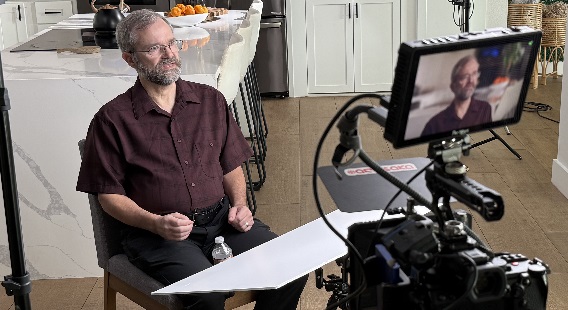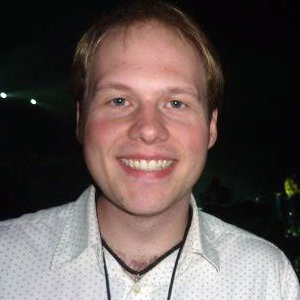Survivor & Specialist Tips: Hobbies to Ease Mesothelioma Anxiety
Health & WellnessWritten by Travis Rodgers | Edited by Amy Edel

We sat down with a 10-year survivor of pleural mesothelioma for our exclusive video interview series and discussed how his diagnosis and treatment journey have affected him. We talked about how a mesothelioma diagnosis can be overwhelming and the importance of managing your mental health while focusing on your overall well-being.
Michael Cole tells us he’s faced many challenges since his diagnosis in April 2015. He underwent an aggressive mesothelioma surgery, an extrapleural pneumonectomy. He’s also undergone chemotherapy, immunotherapy and radiation treatments.
Throughout his mesothelioma journey, he shares that finding ways to stay grounded have made an important difference for him. Michael says reading is his favorite hobby.
“For me, it’s a wonderful thing. What you read is important when you’re dealing with pain and stress,” Michael shares. “If there’s a lot of pain and stress in the story or whatever you’re reading, you probably need to be reading something else. Then, when you feel better, you read what you normally read. If you notice that it’s bothering you, quit. Read something else.”
He also shares that shooting is another favorite activity of his. Michael says it helped his recovery after surgery so much that he considers it a form of therapy.
“To just go out there, be able to sit at the bench with a .22 rifle and just poke holes in paper,” he reflects. “It helps with concentration and relaxation because both of those things are the core of shooting.”
Interestingly, Michael also says he’s found shooting has helped him with breath control. He explains, “It actually helped me with my breathing. For a long time after my surgery, my heart rate was very high. So using the techniques and shooting to try to manage my heart rate and my breathing was hard for me. But it was a great exercise. It was almost a type of therapy.”
Michael says that if shooting isn’t for you, painting can offer similar benefits. He suggests any activity needing motor skills and concentration can help you focus on something other than your mesothelioma diagnosis and relax both your mind and body.
Turning New Challenges Into Opportunities
Michael believes you can turn a negative into a positive. If your diagnosis keeps you from enjoying a favorite hobby, he says it’s a chance to try something new. He learned this lesson firsthand when one of his favorite activities became too difficult after his mesothelioma treatments.
“I think people have to come to grips with the fact that there are things that they can’t do, that they used to do perhaps. But it’s okay,” he assures. “It’s just an opportunity to do new things, and you’ll get better. Then maybe you do those things that you enjoyed again.”
He says he’s been able to return to some favorite activities with his wife, Tania. Michael reminisces, “My wife and I enjoyed kayaking before all of this happened. Then, after I got somewhat better, we were able to go again. That was great.”
Michael explains that he and his wife started using a tandem kayak, which worked better for him. When he felt tired, he could rest while she paddled. Once he caught his breath, he would start paddling again.
Finding Engaging Hobbies to Keep Your Mind Active
Soon after his surgery, Michael’s children bought him a set of 2-dimensional and 3-D puzzles. He now recommends puzzles to others who want to keep their minds active.
“You go through this little book, and you put these little plastic puzzle pieces in place to make certain patterns and shapes,” he shares. “It’s something very simple that I did for hours. I went through that whole book. It helped keep my mind off the pain, which was rather extreme at that time.”
Michael says that the mesothelioma medication he took soon after surgery made it hard to concentrate. This difficulty affected his ability to read or watch TV. He found doing puzzles for hours was a real benefit for his mental health.
“I think activities like that are really important and not only to keep one’s mind settled,” Michael suggests. “I think they’re a type of therapy. They keep our brain working in some cases, to help us regain control of our bodies again. I think hobbies are tremendously helpful.”
He adds, “And the great thing about hobbies is they’re not like work where it can be stressful. You can choose your hobby and there’s no pressure. If it starts to cause you too much stress, you can quit doing it.”
Shifting Focus to Reduce Anxiety
In addition to keeping his mind sharp and improving focus, Michael tells us keeping his mind engaged helped him shift his focus. Redirecting thoughts from the stress of coping with a mesothelioma diagnosis to an enjoyable activity was helpful.
“I enjoy watching a certain amount of television, but I find it not really that helpful. It’s too easy for the mind to wander,” Michael shares. “I think a person should moderate the amount of TV time and try to do some other things instead.”
He emphasizes, “Don’t sit there and dwell on what’s going on with you, your illness, what’s next and all of that. Focus on something else. Focus on something you like. Focus on a hobby mentally. Keep your mind busy.”
Thoracic surgeon Dr. Jacques Fontaine agrees. We spoke with him while he was also here for our exclusive video interview series. Dr. Fontaine shares some of the best ways to reduce anxiety after a cancer diagnosis.
Tips for Reducing Anxiety
- Eating healthy: Maintain a nutritious mesothelioma diet
- Leisure activities: Playing games or cards, engaging in cultural activities, etc. can all help keep your mind busy
- Physical activity: Sports and other types of exercise for mesothelioma help your mind and body
- Staying social: When possible, going to church, seeing friends and visiting family can help you feel connected and keep your mind busy
Dr. Fontaine says the key is to focus on enjoying today. He advises, “You can’t start thinking, what’s going to happen in 6 months? What’s going to happen a year from now? No, you live day by day. You wake up that morning and you ask yourself: ‘What am I going to do today to make today a good day?’”
He says with this shift in thinking, “Then today is going to be a good day. And then tomorrow is going to be a good day. And then good days are going to become weeks, which are going to become months and hopefully years. That’s how I think you can get a grasp on this cancer diagnosis.”
Staying Engaged Despite Fatigue
Many people experience fatigue because of mesothelioma symptoms and treatment side effects. Michael says there are activities that can help keep your mind engaged even when your energy levels are lower.
“There are times when you’re too tired and in that case, read or draw or work crossword puzzles,” Michael recommends. “There’s any number of things that you can do that don’t involve a lot of energy.”
He admits, “It’s so easy for me to say, ‘I don’t really feel like doing that because I’m tired.’” But he says it’s important to push yourself if you can. Michael says, “But if you’re able to, do as much as you can without just exhausting yourself. It’s important not to just sit there all the time.”
Michael says he’s now thinking about picking up a new hobby he hasn’t tried since he was a kid: putting together plastic model kits. He says it’s just one more idea to help him stay busy.
“There’s no shortage of things you can do that don’t require a lot of physical activity,” he observes. “I think it’s really important that you find those things. They may be things that you never thought about doing before.”







